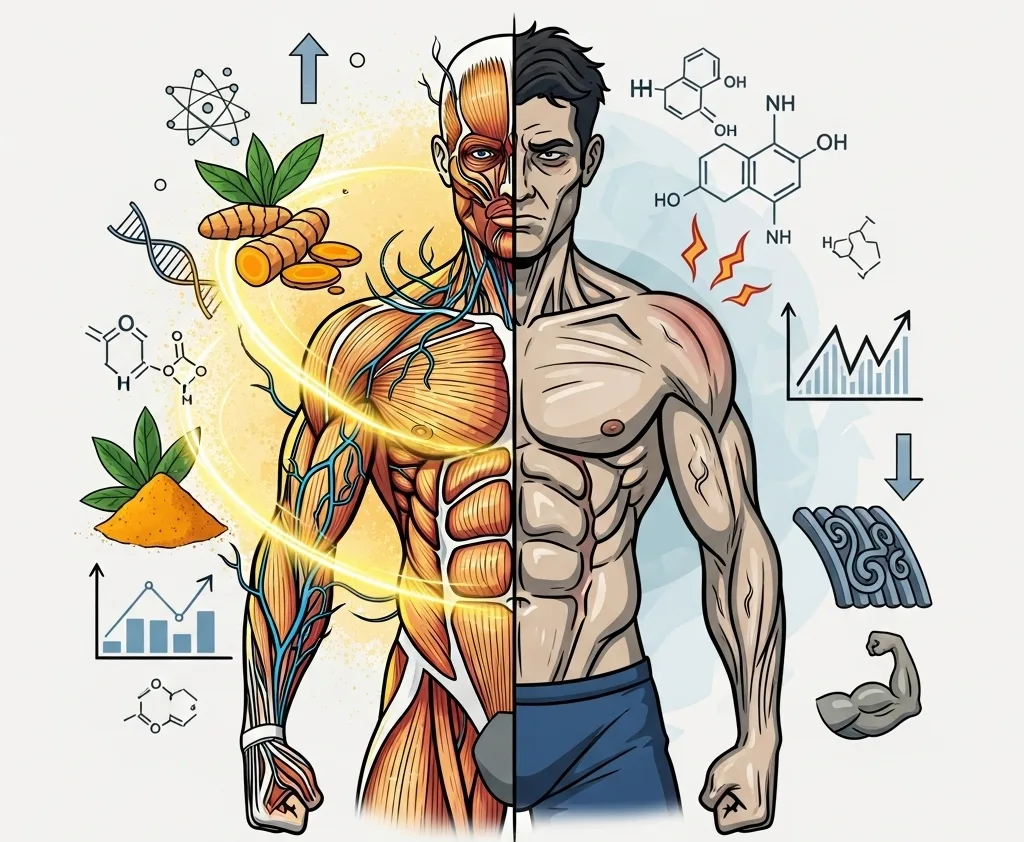Curcumin for Athletes: Separating Fact from Fiction
Curcumin, the vibrant yellow compound found in turmeric (Zardchube), has earned a reputation as a powerful superfood. Comprising just 3-5% of turmeric, this ingredient is the source of many of the spice’s purported health benefits. A quick Google search will reveal a long list of advantages, but for athletes and those on an anabolic cycle, a more nuanced understanding is needed. We're going to dive into the science to see how curcumin truly affects athletic performance, muscle growth, and overall health, separating the proven benefits from the popular myths.
The Core Benefits of Curcumin
Curcumin is a potent antioxidant, but its most well-researched benefit is its powerful anti-inflammatory action.
Natural Anti-Inflammatory: Curcumin acts as a natural anti-inflammatory agent, and its effects can be compared to non-steroidal anti-inflammatory drugs (NSAIDs) like aspirin. Unlike NSAIDs, however, curcumin may offer its own unique advantages without some of the common side effects. This property is incredibly valuable for athletes, as it can help manage exercise-induced inflammation, potentially speeding up recovery and reducing joint pain.
A Powerful Antioxidant: As an antioxidant, curcumin helps neutralize free radicals in the body. While this is generally a good thing for overall health—it can reduce oxidative stress, lower the risk of chronic diseases, and even help fight age-related conditions—it’s a double-edged sword for athletes. The oxidative stress that occurs during exercise is a key signal for muscle adaptation and growth (hypertrophy). By reducing this stress too much, curcumin might potentially inhibit some of the signals needed for significant muscle gain.
Brain and Cognitive Health: Curcumin has been shown to boost brain-derived neurotrophic factor (BDNF), a protein that plays a crucial role in brain function and the growth of new neurons. This has led to research suggesting it may improve brain function, lower the risk of brain diseases like Alzheimer's, and even help with depression. For athletes, improved cognitive function can translate to better focus and reaction time during training and competition.
Curcumin and Anabolic Cycles: A Closer Look
When it comes to anabolic cycles, curcumin's effects are complex and require careful consideration.
Liver Support: One of the most promising areas of research for bodybuilders and athletes on cycle is curcumin's potential to help heal and protect liver enzymes. Anabolic cycles can place significant stress on the liver, and some studies suggest that curcumin may help mitigate some of this damage, both during and after a cycle.
Hormonal Balance: This is a critical point to consider. Some research indicates that curcumin may lower levels of DHT and testosterone, which can subsequently impact estrogen levels. While this can be a benefit for individuals dealing with prostate cancer, which thrives on DHT, it is a significant disadvantage for an athlete focused on building muscle mass and strength. Lowering testosterone and DHT can directly counteract the goals of an anabolic cycle.
The Synergistic Effect of Piperine
To truly unlock curcumin’s benefits, it's essential to understand its absorption. Curcumin has poor bioavailability, meaning the body struggles to absorb and utilize it effectively. This is where piperine, the active compound in black pepper, comes in. When consumed together, piperine can dramatically increase the absorption of curcumin, amplifying its effects. For this reason, many high-quality curcumin supplements are formulated with piperine to ensure you get the most out of each dose.
Potential Side Effects and Dosage
While generally considered safe, high doses of curcumin can lead to some side effects:
Digestive Issues: The most common side effect is digestive discomfort, including gas, bloating, and diarrhea.
Skin Rash: Some individuals may experience a skin rash.
Headache and Nausea: In some cases, a high intake can lead to headaches and nausea.
Dosage: The recommended intake is approximately 1.4 mg per pound (3 mg/kg) of body weight per day. It is always best to consult with a healthcare professional before starting any new supplement, especially when on an anabolic cycle.
Conclusion: Is Curcumin Right for You?
Curcumin is a powerful natural compound with a host of proven benefits, from reducing inflammation and acting as an antioxidant to supporting brain and liver health. However, for a competitive athlete or bodybuilder, its potential to lower testosterone and DHT and its strong antioxidant effects—which could theoretically hinder muscle hypertrophy—make it a compound that requires an individualized approach.
Ultimately, whether the benefits outweigh the potential drawbacks depends on your specific goals and health status. It is a supplement that can be incredibly beneficial for overall health and recovery, but its use should be carefully weighed against your training and performance objectives.

